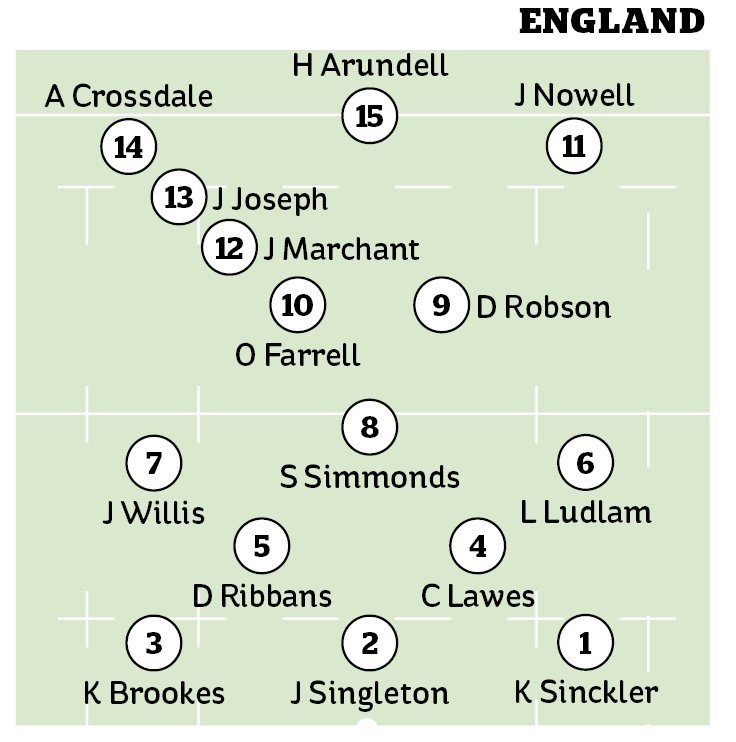
[ad_1]
Robson, Farrell, Nowell, Marchant, Joseph – it is a midfield that England would have struggled to better on many occasions in recent years, full of running and creativity.
Yet by their self-imposed rules, this is a team that Steve Borthwick cannot name, even if he wanted to, because all five play in France.
The RFU has a ban, first instituted in 2012, on selecting players who play their club rugby abroad, a policy that used to keep its top talent on this side of the Channel.
But as the English game has come under increasing financial pressure while the French domestic product has thrived, the prospect of forgoing an international future has become increasingly attractive.
Read Next
After the 2023 Rugby World Cup, the culmination of a cycle during which three Premiership clubs went under and the salary cap underwent a reduction of nearly 25 per cent, there was an exodus of English players to France, eventually including record points-scorer and former captain Owen Farrell.
Farrell’s move was partly facilitated by removing himself from international rugby for his own mental wellbeing, allowing him to move to France consequence-free, but for many doing so put their international career, at best, in the deep freeze. That ranged from Henry Arundell, a winger who only turned 22 last week and already had 10 caps before joining Racing, to Kyle Sinckler, a six-time British and Irish Lion with a seven-year international career.
Sinckler is not the only prop to have made the leap – Kieran Brookes, Will Collier and Harry Williams are all packing down in France now – and their absences are particularly keenly felt. While Marcus Smith is keeping Farrell out of sight and out of mind for Steve Borthwick, a chronic lack of depth in the front row must have him casting a jealous eye southwards.
The scrum has been a persistent area of weakness for England: Sinckler squarely blames his own scrummaging for the World Cup semi-final defeat to South Africa, but he would add much needed depth to a scrum that went to pieces against Australia and faces an Everestian challenge to achieve parity against South Africa.
Relaxing the overseas player rule would offer Borthwick more scrum options, but its also an area where broadening the knowledge base can be valuable too.
 An entire XV of exiles (Graphic: i)
An entire XV of exiles (Graphic: i)
“The spirit of the scrum is very different,” Sinckler says. “In Toulon, the scrum is a story of life and death, it’s exhilarating. In England, we are more analytical. Here [in France], the scrum, we put emotions into it. It’s a whole city and a region that vibrates. In Toulon, you feel like a gladiator. I love it.”
Fellow tight-head Brookes, now at Perpignan, told RugbyWorld in 2022: “They love the scrum. That’s one of the cliches about France that came true. Back rows, second rows, coaches, they all love the scrum.”
It’s no coincidence that Daan Human, the Springboks scrum coach of whom Schalk Brits this week said “if someone drops a ball he looks like a little kid in a candy shop as he is so excited for the next scrum”, spent most of his playing career at Toulouse.
Read Next

Sinckler still harbours hopes of bringing what he has learned in France back to English rugby and playing for his country at the next World Cup, but the current system does not encourage that approach.
Exceptions have been made. When Wasps went bust, Jack Willis was given special short-term dispensation to keep playing for England after joining Toulouse. That dispensation expired but Willis stayed abroad, and is regularly touted as the best flanker in the Top 14. He hopes one day he can be the best in the Six Nations too.
“To play for England, you’ve got to play your best rugby and I felt like [Toulouse] was the right place for me to develop as a rugby player and be the best player I can be,” Willis said last summer.
“I know those two things sort of contradict at the moment but I am hoping it ends up changing so they can align slightly better.”
If there is any softening towards overseas players, it is well hidden.
“Having our English players playing within the Premiership is important for England and for the Premiership,” said Premiership CEO Simon Massie-Taylor last year. “From the RFU’s, ours and even the players’ perspective, we all see the importance of England internationals playing domestically.”
But trouble could be on the horizon for those hoping the rule will continue to protect the Premiership’s future.
“The RFU’s overseas player rule may be susceptible to a legal challenge,” concludes Ben Cisneros, associate of Morgan Sports Law, in a detailed analysis of the regulations that could be found to breach restraint of trade or competition law.
There are also the new central England contracts to consider though, designed to stave off the threat of the French domestic game. A total of 50 contracts – 25 enhanced and 25 “squad” deals – offer England’s most senior players the stability of a lucrative salary, while also giving the RFU greater control over where and when those players do and do not play domestically. It may also help to defeat a legal challenge, since players in France are no longer missing out on England match fees of nearly £25,000 a game.
They may not be missing out, but England are missing out on them.
[ad_2]
Copyright for syndicated content belongs to the linked Source link


